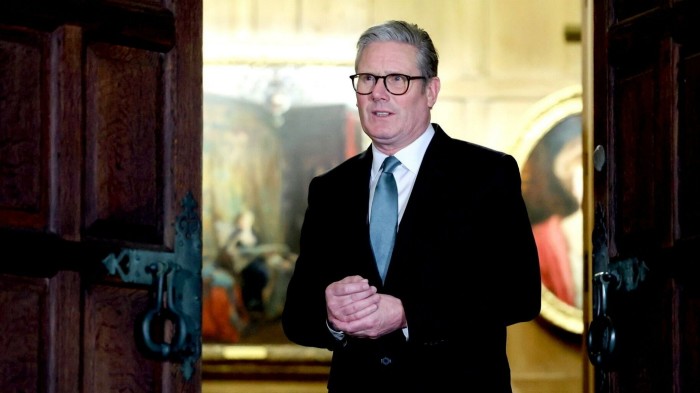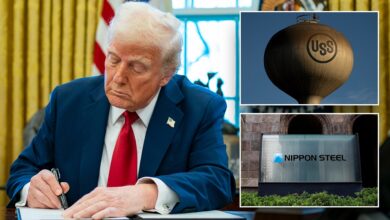Keir Starmer aims to refocus attention on growth after hit from markets

Prime Minister Sir Keir Starmer has promised to make Britain “the best state partner” for artificial intelligence companies in the world, as he tries to boost UK growth prospects against an ominous economic and political backdrop.
Starmer, writing for the Financial Times, claimed Britain’s “values of democracy, open commerce and the rule of law” made the UK a natural location for AI companies to invest, and vowed to sweep away planning restrictions and create new “AI growth zones”.
“I am determined the UK will become the best place to start and scale an AI business,” he wrote on Monday. “I know growth in this area cannot be state led. But it is absolutely the job of government to make sure the right conditions are in place.”
Starmer hopes to get back on the front foot after a week in which his economic plans were battered by the markets, leaving chancellor Rachel Reeves potentially facing the need to cut spending or raise taxes to keep her fiscal plans on track.
The pound fell 0.8 per cent to a 14-month low of $1.211 on Monday, extending a slide fuelled by a stronger US dollar and a global sell-off in bond markets that has hit the UK particularly hard.
Britain’s borrowing costs hit a 16-year high last week against a backdrop of sticky inflation and fears that Reeves’ tax-raising Budget had contributed to stagnating growth.
At a press conference on Monday, Starmer vowed to keep to Reeves’ fiscal rules and expressed his “full confidence” in his chancellor. But he did not reply directly to questions about whether the government would cut spending further this year to comply with the rules.
The UK prime minister argued that AI would “change things quicker than we think”, helping raising the country’s growth rate.
The UK has a mixed record in fostering the AI industry. It has struggled to remain competitive with Silicon Valley-based start-ups, with British companies raising just a fraction of the $56bn invested globally in generative AI groups last year, according to PitchBook.
The previous Conservative government and the current Labour administration have also wrestled with how aggressively to regulate the fast-growing sector. In recent years, British regulators such as the Competition and Markets Authority have been routinely attacked by US executives for slowing the pace of dealmaking in the sector.
London is home to pioneering AI group DeepMind, which was founded in 2010 but sold to Google four years later and now forms a core part of the search giant’s AI strategy.
Big tech companies such as Meta and Apple have also been slower to roll out their latest AI services in the UK than in their home market, and some in the tech industry are concerned that the UK’s Digital Markets, Competition and Consumers Act, passed last year, could throw up similar restrictions to the EU.
Starmer’s attempt to position the UK as a global force in AI also comes as he has faced a series of inflammatory allegations in recent weeks from Elon Musk, one of the industry’s most powerful figures, over his record in tackling child sexual exploitation when he was head of the prosecution service.
Starmer has also pledged to establish a “gold standard” data access regime that will “unlock the innovation potential of NHS data”. Ministers believe that NHS data could form part of a new National Data Library, which would be made available to “support AI research and innovation”, as well as to improve public services and help academia.
Although the scheme is still being finalised, any NHS data would be owned by the National Data Library rather than handed over to AI companies, a person familiar with the plans stressed.
However, any move to offer health data to US tech giants would still be controversial. A previous deal between DeepMind and London’s Royal Free NHS Foundation Trust to share 1.6mn patients’ records triggered a backlash from privacy campaigners and the project was ultimately cancelled.
The government said the National Data Library — which was proposed in Labour’s election manifesto last year — would ensure any sensitive data is held securely and would safeguard privacy, for instance by removing any information that could be used to identify the patients involved.
As Starmer seeks to attract more investment from the AI industry, Reeves, who returns on Monday from a visit to China, will this week “haul in” regulators to tell them to be more ambitious in sweeping away barriers to growth.
The sense of economic gloom was compounded by a survey of UK chief financial officers by Deloitte, which showed that business optimism fell to a two-year low in the fourth quarter.
The survey found that a net 26 per cent of finance chiefs reported feeling more pessimistic about the prospects of their business than three months ago, marking the first time sentiment has tipped into negative territory since the second quarter of 2023.
Finance chiefs said that cutting costs would be their most likely response to Reeves’ £25bn rise in employer national insurance contributions.
Deloitte said UK corporates expected to cut capital expenditure, discretionary spending and reported the sharpest fall in hiring expectations since the pandemic. Nonetheless, the survey found that confidence was well above lows seen in 2020 and 2022.
In early trading on Monday, the 10-year gilt yield was up 0.05 percentage points at 4.89 per cent, but below last week’s high of 4.93 per cent.
Mel Stride, shadow chancellor, told the BBC that “business confidence is falling through the floor because of actions the government has taken” and insisted Reeves should have cancelled her China visit to calm markets.
But one adviser to the chancellor said: “Is he seriously saying she should have scrapped the trip to stay at home over the weekend to address a closed market? It would have rightly been seen by the markets as panic.”
An ally to Starmer said any suggestion that Reeves’ position was under threat was “complete rubbish”.
Starmer continues to believe that Reeves’ October Budget, which sought to stabilise public finances and shore up public services with a £40bn tax rise, will be vindicated in the long run, in spite of the market turmoil.
Reeves is planning her own speech on growth, but it has been delayed until after her trip to the World Economic Forum in Davos later this month.
On Thursday, she will summon eight regulators to explain what they are doing to boost growth. In her Mansion House speech in November she told watchdogs: “The UK has been regulating for risk, but not regulating for growth.”
Additional reporting by Oliver Ralph, Tim Bradshaw, Anna Gross and Madhumita Murgia in London
https://www.ft.com/__origami/service/image/v2/images/raw/https%3A%2F%2Fd1e00ek4ebabms.cloudfront.net%2Fproduction%2F571995cc-3b5c-49b3-89ad-d354b7ccd988.jpg?source=next-article&fit=scale-down&quality=highest&width=700&dpr=1
2025-01-13 06:24:36




